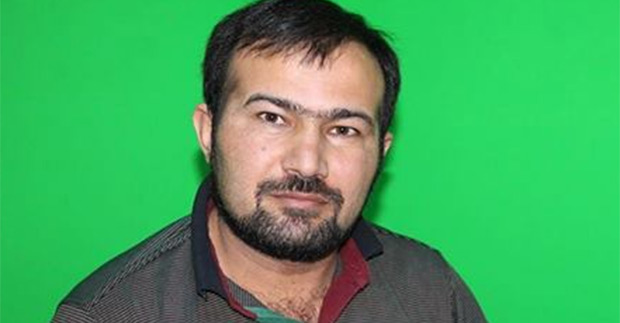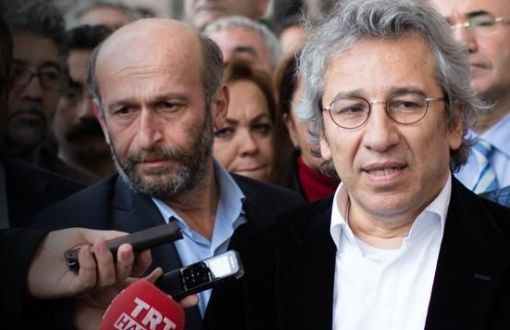Index relies entirely on the support of donors and readers to do its work.
Help us keep amplifying censored voices today.

Seymur Hezi was sentenced to five years in prison for “aggravated hooliganism” on 29 January 2015.
On the anniversary of Azerbaijani journalist Seymur Hezi’s sentencing to five years imprisonment for “aggravated hooliganism,” the country’s authorities have continued to target journalists, independent media and human rights activists.
Hezi, who contributed to the Index on Censorship Freedom of Expression Award-winning newspaper Azadliq, was sentenced on 29 January 2015. He was arrested on 29 August 2014 following an altercation in which the journalist was defending himself from a physical assault and harassment, according to his lawyers.
Rahim Haciyev, acting editor of Azadliq, told Index in September 2015 Hezi’s prosecution was due to his critical articles of the Azerbaijan authorities in the newspaper, as well as critiques he had made in his online TV programme, Azerbaijan Hour.
Haciyev said Hezi’s health is “very bad” due to the Azerbaijan’s awful prison conditions. Despite this, he said the journalist is working on articles about the country’s recent political history — some of which have been published in Azadliq.
In Hezi’s final statement given during his trial, he noted his belief in the shared struggle “with my dear friends at prison”. He also said: “It is not just a confrontation between the government and the opposition. It is the struggle between the good and the evil.”
After a year activism and journalism dedicated to free expression within the restricting country, not much positive change can be seen. Investigative journalist Khadija Ismayilova remains in jail, doing everything in her power to continue spreading the message of truth and resistance. Human rights lawyer Amal Clooney recently offered to take Ismayilova’s case to the European Court of Human Rights.
Azadliq, which was one of Azerbaijan’s only remaining independent news outlets operating inside the country, was forced to discontinue publishing a daily print edition of the newspaper in July 2014, due to its financial situation. The paper was hit with enormous fines following multiple defamation suits in 2013, and its journalists — including Hezi — have been targeted by authorities with politically motivated charges.
“The repression and detainment of journalists are continuing,” Haciyev said. “[The] government has started to arrest Facebook activists.”
Haciyev said that because the government cannot solve its country’s main problems, they try to create new problems for society through eliminating any chance of other opinions being promoted.

Kunle Olulode, Max Wind-Cowie, Jodie Ginsberg and Shazia Mirza at last night’s debate (Photo: Sean Gallagher / Index on Censorship)
“When I went to the Loaded offices with hairy legs they told me to get out and that I could never be on the cover of the magazine because apparently I’d made an effort with my nails but not my legs,” said comedian Shazia Mirza, at the launch of the latest taboo-themed issue of Index on Censorship magazine.
Do taboos still exist in society today? Are taboo subjects still brushed under the carpet instead of being faced head on? Is comedy a perfect platform to tackle these issues? These were just some of the questions discussed during the evening of discussion and debate.
Chaired by Index on Censorship chief executive Jodie Ginsberg, panellists included Kunle Olulode, director of campaigning charity Voice4Change England, writer and political consultant Max Wind-Cowie, plus comedians Grainne Maguire and Mirza.
The night kicked off with a fast and furious comedy performance from Michele Moran, filled with tales of taboos and secrets.
Wind-Cowie told the audience at the Royal Vauxhall Tavern of his surprise when people reacted to Rupert Murdoch and Jerry Hall’s marriage with jokes and disgust at the thought of older people having sex.

Index on Censorship’s CEO Jodie Ginsberg with comedians Shazia Mirza and Grainne Maguire (Photo: Sean Gallagher / Index on Censorship)
He said: “I think it’s a bit sad because I hope to be an older person one day, and I hope that the older person that I will become will be allowed to have sex with someone. And I hope that when we are having sex they won’t be looking at me and thinking ‘my God you’ve got disgusting’. So I think it’s wrong that it’s something we all laugh at so much.”
Maguire joked to the audience that mental illness was a requirement as a comedian but agreed there was still a lot of stigma around mental health.
“In certain careers you’re supposed to be macho and mental illness is still seen as a sign of weakness. I just think that’s really depressing and sad. I think you should be allowed to be vulnerable, but I don’t think were there yet,” she said.
The panel moved to discussing whether suicide and grief were taboo in different societies. Mirza said: “Some Muslims believe that suicide is wonderful. You blow yourself up and go into the afterlife where there are virgins and wine. So it may be terrible in the West but to Muslims suicide is great, and we talk about it all the time.”
Olulode told the audience how for him the last taboo was racism. “In terms of race, there’s a lot of discussion about the discrimination and the attitudes towards black people, but we rarely discuss the construction of what it is to be white.”
He said: “There’s an old left-wing saying: ‘Nothing is alien to me.’ And that idea of investigating every aspect of humanity seems to have become lost along the way. The contestation of ideas in society today is more about protecting people from being exposed to difficult subjects or ideas than actually tackling them head on.”
The evening was rounded off with a lively taboo disco set from DJ Bamboo.
Russia’s media freedom has declined under the government of Vladimir Putin. The president and his allies have used a cloak of legislative legitimacy to target potential opposition to his rule. Mapping Media Freedom correspondents Ekaterina Buchneva and Andrey Kalikh explore what this means for two important sectors of the Russian media.
By Ekaterina Buchneva, Mapping Media Correspondent
Under Russia’s law on mass media amended in autumn 2014, foreign owners are restricted to 20% of shares in media organisations in the country. Its authors said that the legislation would halt the West’s “cold information war”. The law has triggered major changes in the Russian media market and, as critics warned when the law was passed, was used to replace international investors with locals loyal to the Kremlin.
The Russian edition of Forbes magazine, formerly owned by German media conglomerate Axel Springer and known for its independent editorial policy, was sold to businessman Alexey Fedotov, who immediately said that the publication was “too focused on politics” and should cover more business news. In January 2016, the magazine named Nikolay Uskov as its new editor-in-chief. Uslov, a former editor-in-chief of the Russian edition of GQ, has never worked in business journalism.
Finland’s Sonoma Independent Media, America’s Dow Jones and the UK’s Pearson also had to sell their shares in Vedomosti, the main business newspaper known for its critical opinion pieces. Now the paper’s new — and only — owner is Demian Kudryavtsev, a business partner of oligarch Boris Berezovsky, who died in 2013, and a former chief executive of major Russian publishing house Kommersant. Kudryavtsev also purchased The Moscow Times, the country’s only English-language daily. Some journalists were concerned about the origin of the money Kudryavtsev used in the deal and suggested that there was another buyer behind him.
The media ownership law also affected a number of glossy magazines, which, as one of the law’s author said, “squeeze articles favorable to the West and the fifth column in between news about cars and glamorous watches”, and entertainment television channels. CTC Media sold 75% of its shares to loyal to the Kremlin oligarch Alisher Usmanov, who also owns the Kommersant publishing house.
The Russian broadcasters of CNN, Cartoon Network and Boomerang, as well as 11 television channels of Discovery group, came under the control of Media Alliance, 80% of which belongs to National Media Group. The president of NMG, which also owns a number of Russian media organisations, including RenTV, Channel Five, Izvestia newspaper and 25% of Сhannel One, is Kirill Kovalchuk, a nephew of Putin’s old friend Yuri Kovalchuk.
Tightening control over foreign publishers
In addition, in December 2015, another bill with new amendments to the “law about mass media” was introduced into the Russian State Duma. It contains more limitations for media organisations, some of them refer to foreign publishers.
The bill suggests new legal background — violation of anti-extremism legislation — for denying or revoking distribution permit for foreign publishers. Among the ones that now have such permits are Frankfurter Allgemeine Zeitung, China Daily, European Weekly, GQ, Cosmopolitan, Esquire, Tatler, Vogue, and some papers from CIS (Commonwealth of Independent States) countries, including Expert.Ukraine magazine.
“The problem is vagueness and inconsistency of the anti-extremism legislation itself and the practice of its implementation by the Russian authorities,” says Damir Gainutdinov, lawyer of Inter-regional Association of Human Rights Organisations “Agora”.
“It is primarily about Article 1 of the Federal Law on Countering Extremist Activity, which gives a definition of extremism, extremist materials, etc. In practice, this definition is used not only for hate crimes but also, for example, criticism of the Russian authorities. Condemnation of the Crimea annexation is recognised as calls for infringement of the territorial integrity of Russia, as it was in the case of Rafis Kashapov (Tatar activist from Tatarstan, who was convinced in September 2015 to three years in jail for posting informational materials criticising Crimea annexation), and criticism of the United Russia is recognised as the incitement of hatred to a social group, as it was in the case of prohibition of video clips by Navalny (a few activists were found guilty of distribution of extremist materials for posting a video by opposition leader Alexey Navalny titled ‘Let’s recall manifest-2002 to crooks and thieves’, on social media). Therefore, any unenthusiastic article published by foreign media may be recognised as a violation of anti-extremist legislation. Another thing is that this applies only to the print media. Since February 2014, it works much easier with websites; they can be just blocked by orders of the general prosecutor office.”
According to the bill, the foreign publishers also will have to pay a fee for issuing a distribution permit. The authors explained that it would “eliminate the unfair advantage of the founders of foreign publications that provides them with more favorable business conditions”.
Another bill, that was already approved by the State Duma, requires Russian media organisations to inform Roskomnadzor (The Federal Service for Supervision in the Sphere of Telecom, Information Technologies and Mass Communications) about foreign funding, including funding from foreign states, international organisations and Russian NGOs that were considered “foreign agents”. The minimum amount of money that should be declared is 15,000 roubles (less than $200). Penalties for not notifying Roskomnadzor will be fines of 30-50,000 roubles (about $400-600) for officials and the amount of money received for companies. A repeated violation will be punished with a fine of 80,000 roubles (about $1,000) and triples amount of money received.
This bill resembles the one adopted in June 2012 by the Russian State Duma, requiring NGOs to register as “foreign agents”, says Damir Gainutdinov. “First, it is a simple registration and then more and more new burdens will be introduced, for example, state bodies will deny accreditation of such media organisations, officials will be banned from giving them interviews and answering their questions … An additional mandatory audit and special checks of staff could be introduced, who knows what else.”
The bill about foreign funding could affect a number of media platforms – from Colta.ru that cover art and culture to Mediazonа that highlights problems of the Russian justice and the penal system.
Limitations for founders of media organisations
Another block of amendments introduces a new restriction for media founders. It suggests that those, who have unspent or unexpunged convictions for crimes against the constitutional order, public security and public safety, can not found a media organisation.
Those crimes include a number of criminal articles – from hooliganism and repeated violation of rules of organising or holding rallies and demonstrations to espionage and treason. But the most tricky ones are incitement of hatred and abasement of human dignity (Article 282 of the Criminal Code of Russia), public calls for extremism (Article 280) and public calls for infringement of the territorial integrity of Russia (Article 280.1), says Damir Gainutdinov. “These articles are used for persecution of dissenters. In absolute numbers, there are not many cases like this against journalists, but such practice is developing gradually – Stomaknih, Yushkov, Kashapov”.
However, these limitations could not prevent dissenters from taking part in media management at different positions. For example, Pussy Riot members Nadezhda Tolokonnikova and Maria Alekhina, who were convinced for hooliganism, founded Mediazona platform, but as Tolokonnikova told RBC newspaper, they were not officially registered as founders as they had foreseen possible legal problems.
By Andrey Kalikh, Mapping Media Correspondent
Russia’s environment for freedom of expression on the internet has declined precipitously since 2002 when the law on Counteracting Extremism was adopted. The definition of extremism used in the law is vague and overly broad, according to Aleksandr Verkhovski, an expert on extremism from the SOVA Information and Analytical Centre in Moscow. Verkhovski said that the law was written to keep independent media, oppositional political parties, and “not official” religious confessions under control.
In 2012, the anti-extremism law was amended to empower Roskomnadzor, the state media and communication watchdog, to launch the United Register of Banned Websites. The modifications also enabled the agency to add websites that have “extremist content” without judicial approval. Once a site is added to the list, Russia’s internet services providers are obliged to block it. Within days of the changes, several independent media outlets and political opposition sites websites and blogs — Grani.ru, Ej.ru, Alexei Navalny’s blog — were blacklisted in the country.
On 30 December 2015 a district court in the Siberian city of Tomsk sentenced blogger Vadim Tyumentsev to five years in prison for two videos he posted on his YouTube page.
In the first video, the blogger criticised the local government’s decision to raise the cost of fares on the city’s public transport. In the second video, he said that authorities help refugees from eastern Ukraine more than they help local residents.
The court recognised both of Tyumentcev’s videos as “having extremist character”. Ekaterina Galyautdinova, the presiding judge, gave Tyumentsev a sentence even longer than the prosecutor had pursued. She also banned Tyumentsev from posting online for three years.
The Tyumentcev case is far from the first time that a blogger has been subjected to a prosecution. In 2007, Savva Terentyev, a blogger from the Siberian city of Syktyvkar, was sentenced to a large fine for “offending a social group” – in this case, the local police force – by writing about bad behaviour and human rights abuses committed by officers. In 2012, Maxim Efimov, a blogger from Petrozavodsk, Republic of Karelia, faced prosecution after he posted an article under the headline.
In 2012, Maxim Efimov, a blogger from Petrozavodsk, Republic of Karelia, faced prosecution after he posted an article under the headline “Karelia is tired of priests”, in which he criticised the leadership of the Russian Orthodox Church. Efimov left Russia and was subsequently granted political asylum in Estonia.
That same year the Prosecutor General Office blocked the website and blog of Alexei Navalny, blogger and opposition leader, for allegedly calling “for mass disorders”. Navalny was sentenced to the administrative detention for 15 days and faced other accusations related to his political activities.
“Bloggers law”
In August 2014, the Russian State Duma adopted a number of amendments to communication legislation. The so-called “bloggers law” required sites with more than 3,000 visitors a day to register with Roskomnadzor and observe the same rules as much larger media outlets.
Under the amendments, all site owners and social media users are required to disclose their names and email address on their websites. Owners and users must keep all the information published on the web including personal data for at least six months and immediately submit to the law enforcement bodies on demand.
Moreover, Roskomnadzor received the right to request personal information from all site owners and users.
Most recently, as of 1 January 2016, the “bloggers law” requires all websites and social media platforms to keep all personal data of Russian users on servers within Russian territory. Failing to do this means Roskomnadzor can block the site or service. Companies can either comply or cease doing business in Russia.
According to the Roskomnadzor spokesman Vladimir Ampelonski, some foreign companies submitted to the requirement and brought their servers to Russia. However, some companies — Google, Facebook and Apple — have defied implementing this change. Facebook representatives met with the authority’s deputy chief, Aleksandr Zharov. At the meeting the company said it will not observe the law because it is “economically disadvantageous”, the Vedomosti newspaper reported.
Empowering the FSB
After Putin’s re-election in 2012, Russian security service FSB’s powers were considerably expanded. Articles of the Criminal Code of the Russian Federation on high treason, espionage and disclosure of state secrets were widened and made ever more vague by introducing language on cooperation with any “foreign organisation, or their representatives in hostile activities to the detriment of the external security of the Russian Federation”.
The FSB has further tried to make investigative journalism more by lobbying members of the State Duma to pass a draft law limiting access to information on commercial real estate transactions. If passed, the law would make it impossible to uncover cases of illicit enrichment by government officials.
This article was originally published on Index on Censorship.
Mapping Media Freedom
|

Journalists Erdem Gül and Can Dündar (Photo: Bianet)
A coalition of leading international free expression and press freedom groups condemns the Turkish government’s refusal to allow supporters to visit journalists Can Dündar and Erdem Gül, who are behind bars for reports claiming that Turkey’s intelligence agency secretly armed Islamist rebel groups in Syria, and calls for their immediate release.
Dündar, editor-in-chief of Cumhuriyet, and Gül, the newspaper’s Ankara bureau chief, are being held at the high-security Silivri Prison, west of Istanbul, reportedly awaiting trial on charges of aiding a terrorist organisation, espionage and disclosure of classified documents.
The charges remain unclear, as the defendants have not been allowed to review indictments against them. However, the case is believed to stem from a May 29, 2015 report published in Cumhuriyet that included a video purportedly showing Turkish security forces searching intelligence agency trucks en route to Syria containing crates of ammunition and weapons.
In recent years, when nearly 100 journalists were held in Turkish prisons, journalists in Turkey were often allowed to visit their imprisoned colleagues. However, in recent months, Turkey’s Justice Ministry has effectively barred most visits for both Dündar and Gül; the only visitors allowed to see them are close family members, lawyers or members of Turkey’s Parliament.
Following the Ministry’s recent refusals to respond to visitation requests put forward by journalists’ groups in Turkey and others, a coalition of 11 international free expression and press freedom defenders submitted a joint request on Jan. 8, 2016 seeking permission to visit Dündar and Gül on Wednesday, Jan. 27.
The coalition includes the International Press Institute (IPI), the Committee to Protect Journalists (CPJ), Reporters Without Borders (RSF), the International Federation of Journalists (IFJ), the European Federation of Journalists (EFJ), ARTICLE 19, Index on Censorship, the Ethical Journalism Network (EJN), PEN International, the World Association of Newspaper Publishers and News Publishers (WAN-IFRA) and the South East Europe Media Organisation.
On Jan. 22, however, Turkey’s Justice Ministry denied the request. In a response, the Ministry cited articles of statute and regulation requiring the Ministry’s permission for such a visit and indicated that the request was denied because permission to visit was not given.
The coalition condemns Turkey’s refusal to allow supporters to visit Dündar and Gül, who were held in solitary confinement for 40 days before finally being allowed to share a cell together early this month, as well as the charges against them.
The persecution of these journalists in retaliation for having reported on a matter of urgent and undeniable public interest, and the refusal to permit visitation in the manner that any other prisoner would be allowed, represent a violation of their rights and a gross abuse of authority. This wrong is compounded by the fact that neither Dündar nor Gül have been convicted of any crime, much less informed of the allegations against them.
The misuse of anti-terror law against these journalists is only the latest in a litany of such cases in Turkey, and joins a list of developments that illustrate growing authoritarianism and a blatant erosion of human rights. They include politicisation of the judiciary, the similar abuse of other criminal laws, the imposition of outright bans on disseminating certain content, the use of state agencies and economic levers to silence media outlets, verbal and – in some cases – physical attacks on critical journalists, and the orchestration of online hate campaigns targeting government critics, among others.
The coalition accordingly calls on Turkish authorities to free Dündar and Gül without delay, to drop all charges against them, and to free all other journalists currently detained in connection with their journalism or the opinions they have expressed. It further urges lawmakers in Turkey to take steps to reverse the country’s trend toward authoritarianism and urges the governments of democratic countries to pressure the Turkish government to meet its human rights commitments under domestic and international law.
-The International Press Institute (IPI)
-The Committee to Protect Journalists (CPJ)
-Reporters Without Borders (RSF)
-The International Federation of Journalists (IFJ)
-The European Federation of Journalists (EFJ)
-ARTICLE 19
-Index on Censorship
-The Ethical Journalism Network (EJN)
-PEN International
-The World Association of Newspaper Publishers and News Publishers (WAN-IFRA)
-The South East Europe Media Organisation (SEEMO)